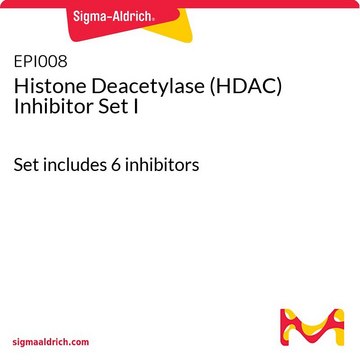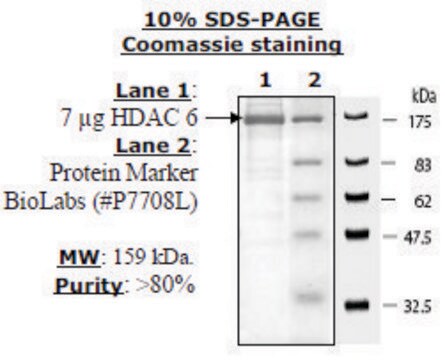CS1010
Histone Deacetylase Assay Kit, Fluorometric
sufficient for 100 assays (96 well plates)
Sinonimo/i:
HDAC Assay Kit
Autenticatiper visualizzare i prezzi riservati alla tua organizzazione & contrattuali
About This Item
Prodotti consigliati
impiego
sufficient for 100 assays (96 well plates)
Livello qualitativo
Condizioni di spedizione
dry ice
Temperatura di conservazione
−20°C
Informazioni sul gene
human ... HDAC1(3065)
Applicazioni
The Histone Deacetylase Assay Kit provides a simple method for the detection of HDAC activity based on a two-step enzymatic reaction. The substrate for this enzymatic assay is a substituted peptide with an acetylated lysine residue and a bound fluorescent group. The first step of the reaction is deacetylation of the acetylated lysine side chain by the HDAC containing sample (HeLa cell extract, purified enzyme, etc.). The second step is the cleavage of the deacetylated substrate by the developer solution and the release of the free highly fluorescent group. The measured fluorescence is directly proportional to the deacetylation activity of the sample.
Azioni biochim/fisiol
Histone deacetylases (HDACs) are enzymes that remove acetyl groups from histone proteins. HDACs are important regulators of gene expression and genome function. They are implicated in a number of human disease states, namely several cancers, neurological disorders, and aging. Therefore, HDAC are relevant key targets for therapeutic intervention. Moreover, histone deacetylase inhibitors have been shown to serve as anti-tumor agents.
Caratteristiche e vantaggi
The kit includes all the reagents required for the fast and easy measurement of HDAC activity in cell or nuclear extracts, or with purified enzyme preparations. In addition, the kit provides HeLa cell lysate as a source of HDAC activity for inhibitor screening or as a positive control, a HDAC inhibitor (Trichostatin A), and a standard to enable activity quantitation.
Risultati analitici
The Histone Deacetylase Assay Kit has been tested on HeLa, HEK 293T, NIH 3T3, and U 973 cell extracts.
Solo come componenti del kit
N° Catalogo
Descrizione
- Assay Buffer 20 mL
- Developer Solution 1.5 mL
- HDAC Inhibitor (Trichostatin A), 1 mM 50 μL
- HDAC Substrate, 20 mM 50 μL
- HeLa Cell Lysate 500 μL
- Standard (non-acetylated substrate), 4 mM 50 μL
Codice della classe di stoccaggio
10 - Combustible liquids
Punto d’infiammabilità (°F)
188.6 °F - closed cup
Punto d’infiammabilità (°C)
87 °C - closed cup
Scegli una delle versioni più recenti:
Possiedi già questo prodotto?
I documenti relativi ai prodotti acquistati recentemente sono disponibili nell’Archivio dei documenti.
I clienti hanno visto anche
Bartosz Bieszczad et al.
Pharmaceuticals (Basel, Switzerland), 14(9) (2021-09-29)
Histone deacetylase (HDAC) inhibitors are a class of drugs used in the cancer treatment. Here, we developed a library of 19 analogues of Vorinostat, an HDAC inhibitor used in lymphomas treatment. In Vorinostat, we replaced the hydrophobic phenyl group with
Lin Du et al.
Journal of natural products, 77(7), 1753-1757 (2014-07-08)
The cyclic tetrapeptide 1-alaninechlamydocin was purified from a Great Lakes-derived fungal isolate identified as a Tolypocladium sp. Although the planar structure was previously described, a detailed analysis of its spectroscopic data and biological activity are reported here for the first
Jason D Plummer et al.
eLife, 10 (2021-03-31)
Methionine restriction (MR) dramatically extends the healthspan of several organisms. Methionine-restricted rodents have less age-related pathology and increased longevity as compared with controls, and recent studies suggest that humans might benefit similarly. Mechanistically, it is likely that the decreased IGF-1
Articoli
Epigenetic modifications are thought to occur through two key interconnected processes—DNA methylation and the covalent modification of histones.
Il team dei nostri ricercatori vanta grande esperienza in tutte le aree della ricerca quali Life Science, scienza dei materiali, sintesi chimica, cromatografia, discipline analitiche, ecc..
Contatta l'Assistenza Tecnica.







